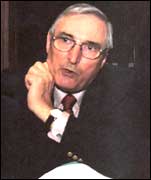 | « Back to article | Print this article |
INSEAD professor Patrick Turner emphasises that it is critical to prepare thoroughly for a new venture, but warns that whatever can go wrong, will.
"I'm only 57 years old so there's plenty of time yet," says Patrick Turner, adjunct professor of entrepreneurship and director of the International Centre of Entrepreneurship, INSEAD.

His body language reflects this youthful zeal -- the professor straddles his chair, leaning on the backrest.
But Turner is not defending his age. Instead he's talking about his failure to get rich as a businessman -- he had unsuccessfully launched a jeans marketing outfit and also acquired another small business that went belly-up in the mid-1990s.
In India recently to unveil a survey on small and medium enterprises, conducted by UPS, the global supply chain services company, Turner proceeded to talk about life after business setbacks.
As he was looking for another entrepreneurial challenge, a friend who was a professor at a local business school in Spain asked him to help out with a research project.
Next in line was a phone call from INSEAD's research centre in France. Within a few months, Turner found himself in the post of an entrepreneurship professor in 1999. The topic he taught: buying businesses.
But trying his hand at business and academic research are not Turner's only qualifications. Apart from his MBA at INSEAD in 1978, which he claims had a profound impact on his life -- "What I am doing now would never have happened if I had not done my MBA there" -- Turner's career includes seven years with British chemical company ICI and 10 years with Levi Strauss.
At Levi's, his assignments included two years as director of strategic planning, and three years as a marketing director in Spain.
Even as Turner charts the course that aspiring businessmen should take, his life has followed its own path. He says that he's managed to straddle a career spanning marketing to research and now, teaching, "totally by accident". Nevertheless, he takes this experience to the classroom.
Based on his experience, Turner recommends that entrepreneurs should follow three basic principles.
"Never forget that Murphy (of Murphy's law fame) finds a happy hunting ground in entrepreneurship," he says.
"If you have a product to develop, it is surprising how often it will take you twice as long and cost you twice your most conservative estimates. So, beware of Murphy."
Turner continues: "Although it is vitally important to plan carefully, it is equally important to remember that the first casualty of a start-up is the business plan, as things invariably turn out differently than anticipated. The only certainty of any plan is that it will be wrong. The only question is in what area and by how much."
The third lesson. "Never, ever run out of cash," says Turner. This statement is backed by the survey report that he presented in India, the Asia Business Monitor Survey -- 23 per cent of SMEs in the Asia Pacific region say that cash flow is their most critical problem.
Can entrepreneurs in the technology age pick up lessons from the dot-com bust? "Basically the old disciplines still apply," he says. For instance, despite business plans that tend to go wrong, it is still vital to prepare a new venture as thoroughly as possible, to reduce risk.
Because what does go wrong in early stages will threaten the life of the new venture.
According to him, one of the main reasons for so many companies failing during the dot-com euphoria was one simple fact.
"All too often, the attitude was that there would be a market, 'build it, and the customers will come'. But new business ideas stemming from a knowledge or high technology root still need to woo customers in the good old-fashioned way," he says.
Turner, whose book Entrepreneurship in Asia was published recently, says the connecting link between entrepreneurs across the globe is tenacity.
"The ability to spot opportunities, stemming in part from a constant restlessness and dissatisfaction with the way things are, the ability to do more with less and the ability to communicate a vision," are common points Turner attributes to all entrepreneurs.
But he says that as start-ups grow in size, entrepreneurs must detach themselves from the day-to-day operations and hand over the reins to professionals.
According to him, when to get out is an important judgement call that successful entrepreneurs need to take. And what do they do after that? Simple.
Move on to another business venture, says Turner, not disguising his interest in starting another venture if the opportunity arose. "I would be tempted," he agrees.